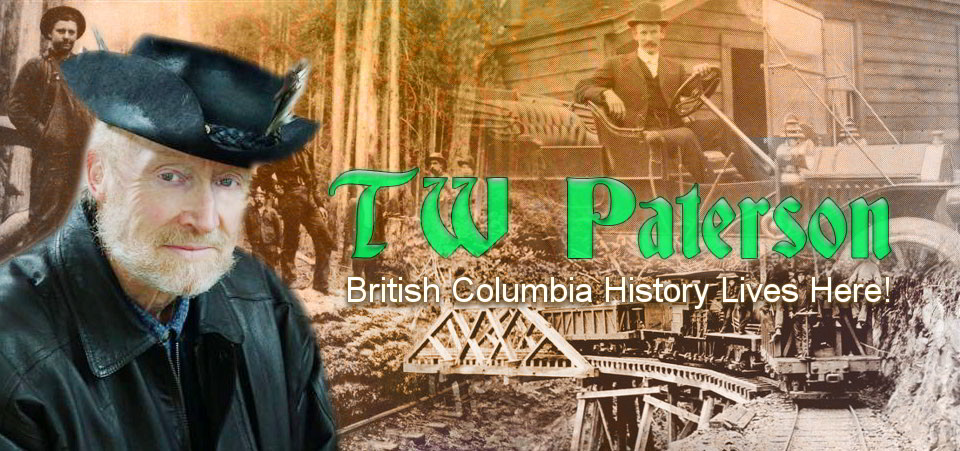Bill Nye: Victoria’s Mystery Man
His real name was Thomas Chaplain but to generations of Victorians the remarkable character with the scraggly beard, ‘antedeluvian’ slouch hat, shabby overcoat and trousers tied with twine was ‘Bill Nye.’
A final touch, a gold earring gave him a distinct Long John Silver air.
As a young man Bill had seen, over a nine-year period, much of the world from the deck and masts of a windjammer, before landing in Victoria in November 1892. A longshoreman for many years, he never lost his interest in the sea. Right up until his death at 90-odd years, he’d delighted in amazing listeners with his near-photographic memory. He could recall every ship he’d sailed on, their cargoes, dates of departure, the names of officers and crewmen.
Not only that, he remembered the first arrival dates and manifests of every liner that had called at Victoria over half a century!
Years before, “when he was more talkative,” the old man had thrilled youngsters with tales of life before the mast and illustrated his South Seas adventures with chalk sketches. But, with passing years, Bill had kept more and more to himself. Although most Victorians knew him by sight, he had few friends. The late Ronald M. Angus, a well-known philatelist, knew him better than most.
“Bill said he was born in Samoa, and spoke of having two sisters in Tasmania, although he hadn’t heard from them in a long time,” Mr. Angus recalled upon Bill’s death, in February 1944. “He had travelled all over the world and was, I am sure, a very well educated man. I think he would be about 95 [when he died]. Bill didn’t talk much but he often used to trudge up here to see me, bearing the inevitable gunnysack over his shoulder. I’d have to guess at his nationality but I would say he had one French parent. His accent was Australian, but he had a French intonation.”
Originally Bill lived in a shack on Kanaka Row until this backwater was filled in prior to construction of the Empress Hotel. Angus first met Bill when the colourful longshoreman would report to the Victoria and Vancouver Stevedoring Co. for his pay. His eye would be taken by a photograph of an old windjammer on the office wall and he’d begin to reminisce, much to the delight of young Angus, the paymaster.
“He would sit down and give accurate data on any barkentine on the walls. He’d quote the date and hour of arrival and could give a complete manifest of her cargo. He was a good worker at the docks and was well liked.”
Chuckling, Mr. Angus remembered the time Bill was jokingly asked if he could change a $500 bill. “Without blinking an eyelash,” Bill pulled out his purse, a large canvas miner’s poke, and made change.
He’d loved the movies and sat through the original Mutiny On the Bounty repeatedly.
Often Victorians had watched, spellbound, as Bill, using shingles as paddles, navigated the Inner Harbour, even far up the Gorge, in the cut-down barrel he used to scour the mudflats for firewood, bottles and salvageable junk. Needless to say, it took practice for Bill, his legs folded beneath him, to navigate as it had no bow, no stern and no keel.
No stranger to discomfort, when he was taken to hospital with a broken leg, nurses had to improvise a bed of planks because the tough ex-seaman, ex-longshoreman was unused to a mattress.
Finally came a day when someone realized they’d not seen Bill for a week or more. Upon checking his cluttered bachelor quarters, they found the old rag-and-bones man dead in his bed, a litter of newspapers and rags. A search of his few effects turned up 420 foreign coins, $81.20 in cash, two watches and two passbooks for four bank accounts which totalled $2000. Of his reputed fortune, said to be about $25,000, there was no clue that such a sum had ever existed although it was learned that he’d owned rental properties in London and Australia.
With his passing, many Victorians echoed the sentiments of friend Ron Angus: “I’m sorry to see old Bill go–it marks the passing of a colourful era and a wonderful old character.”
(Excerpted from Capital Characters: A Celebration of Victorian Eccentrics by T.W.Paterson)

I have often wondered what happens to material belongings once someone walks away from their ‘life’? I often wonder if Vancouver has homes/property that’ve been maintained via automatic tax payments, yet its owner is nowhere to be found (eg: my ex brother in law, last seen in 1992). Ah well
People who leave no wills are declared ‘intestate’ and their affairs placed in the hands of a public trustee. When they’re known to have died, of course. TW